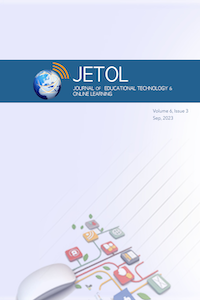Abstract
References
- Ahonen, A. K., & Kinnunen, P. (2015). How do students value the importance of twenty-first-century skills? Scandinavian Journal of Educational Research, 59(4),395-412.
- Asghar, A., Ellington, R., Rice, E., Johnson, F., & Prime, G. M. (2012). Supporting STEM education in secondary science contexts. The Interdisciplinary Journal of Problem-based Learning, 6(2), 85–125.
- Baptista, M., Costa, E., & Martins, I. (2020). STEM education during the covıd-19: teachers' perspectives about strategies, challenges, and effects on students' learning. Journal of Baltic Science Education, 19(n6A), 1043-1054.
- Becker, K., & Park, K. (2011). Effects of integrative approaches among science, technology, engineering, and mathematics (STEM) subjects on students’ learning: A preliminary meta-analysis. Journal of STEM education: Innovations and research, 12(5/6), 23-37.
- Bell, D. (2016). The reality of STEM education, design, and technology teachers’ perceptions: A phenomenographic study. International Journal of Technology and Design Education, 26(1): 61-79.
Abstract
This study aims to compare the views of science teachers on face-to-face and online STEM-based activities. The study was carried out with phenomenology; one of the qualitative research methods. Five science teachers (three female, two male) participated in the study. Data were collected with a structured interview form. Since they were in the distance education process, audio and video recordings were taken during the interviews. Descriptive and content analysis methods were used to analyze the data. In the interviews, STEM-based activities of science teachers; It is seen that they mostly associate with "Physical Events" and "Science, Engineering and Entrepreneurship" from the learning fields. Teachers stated that it is easier to provide classroom management, group work, and collaboration in face-to-face STEM activities. However, in some large group studies, classroom management becomes difficult. They mentioned the physical exhaustion and the difficulty of completing the program. However, in STEM-based activities in the distance education process, the teachers stated that being in cooperation with the family is an advantage, and the problems in terms of materials, time, technological infrastructure, and mobile devices are disadvantages. According to the results of the research, it can be ensured that STEM activities can be better structured in face-to-face lessons than in the distance education process. Because in face-to-face education the characteristics of the students can be determined in advance and the course contents and teaching strategies can be prepared accordingly, communication problems (lack of technical infrastructure, internet speed problems, etc.) can be resolved.
References
- Ahonen, A. K., & Kinnunen, P. (2015). How do students value the importance of twenty-first-century skills? Scandinavian Journal of Educational Research, 59(4),395-412.
- Asghar, A., Ellington, R., Rice, E., Johnson, F., & Prime, G. M. (2012). Supporting STEM education in secondary science contexts. The Interdisciplinary Journal of Problem-based Learning, 6(2), 85–125.
- Baptista, M., Costa, E., & Martins, I. (2020). STEM education during the covıd-19: teachers' perspectives about strategies, challenges, and effects on students' learning. Journal of Baltic Science Education, 19(n6A), 1043-1054.
- Becker, K., & Park, K. (2011). Effects of integrative approaches among science, technology, engineering, and mathematics (STEM) subjects on students’ learning: A preliminary meta-analysis. Journal of STEM education: Innovations and research, 12(5/6), 23-37.
- Bell, D. (2016). The reality of STEM education, design, and technology teachers’ perceptions: A phenomenographic study. International Journal of Technology and Design Education, 26(1): 61-79.
Details
| Primary Language | English |
|---|---|
| Subjects | Studies on Education |
| Journal Section | Research Article |
| Authors | |
| Publication Date | September 30, 2023 |
| Published in Issue | Year 2023 Volume: 6 Issue: 3 |

